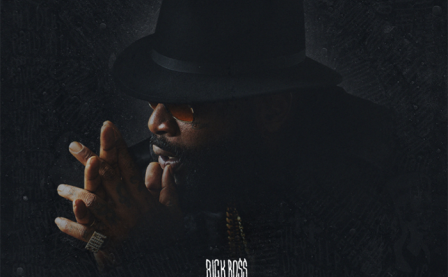The best part of Rick Ross’ career to date might be the humorous calender inspired by his 2006 breakout hit, “Hustlin” (can you guess which activity is scheduled every day?), so my expectations for his fourth full-length, Teflon Don, were low — in spite of the fact that he has managed to acquit himself nicely on a few excellent summer jams, most notably the remix of DJ Khaled’s “All I Do Is Win.” Imagine my surprise to discover that Teflon Don is not only not atrocious, but it may also actually be one of the better rap albums of 2010. Admittedly, the bar is set low, as mainstream rappers have generated some outstanding singles but few listenable full-lengths in the new millennium. In a genre where “classic” albums are so few and far between due to unfunny skits, senseless dialogue, throwaway filler tracks, and bloated guest lists, the first notable feature of the Miami rapper’s new album is its economy: Teflon Don clocks in under 50 minutes, with only 11 tracks. It’s even difficult to pick out the singles without prior knowledge, as the quality remains consistent throughout.
What makes the album tick is a combination of thorough production and solid (if unspectacular) mic skills. The production is thick, layered, and grandiose — a welcome rejoinder to any number of the thin, tinny tracks that have dominated urban radio for the last five years. Strings swell, drums recede and reassert, and every production has its own dramatic arc. None of the beats are mere repetitions of a four-bar phrase, and the effort to flesh out each track into a real song is fruitful and rewarding. What makes this all the more remarkable is that with so many producers — Clark Kent, No I.D., The Olympicks, J.U.S.T.I.C.E. League, Lex Luger, Danja, The Inkredibles, The Remedy, and Kanye West all contribute tracks — thematic and atmospheric consistency remain intact.
Rick Ross is not a particularly nimble or sophisticated rapper, nor are his lyrics impressive, but it’s hard to nitpick his flow when he employs such confidence and panache staying within his limitations (and, to paraphrase Del tha Funkee Homosapien, MCs should know their limitations). His mafioso persona, which seemed boilerplate at the beginning of his career, has since been fleshed out with introspection, regret, and soul-searching. Ross boasts not about his musical prowess, but rather about his bank account; it’s clear he sees rapping as a means to a different end. He revels in material excess while asking “what have I done to deserve this?” in a manner that recalls other lauded sensitive-thug platters like The Blueprint and Late Registration.
The one potential red flag raised by the back of the CD is that almost every track has a high-profile feature artist, and the roster is staggering: Jay-Z, Gucci Mane, Kanye West, Drake, T.I., and Jadakiss all drop in to contribute verses, while Erykah Badu, Cee-Lo, and Ne-Yo sing hooks. Only the album’s first song appears without any guests. Satisfyingly, the guest contributions conform to the atmospheric template set by Ross at the top of the lineup, and it almost seems as though the more gifted MCs in the bunch made an effort not to overshadow the main event. (Those T.I. and Jay-Z verses could have invited some pretty unfavorable comparisons otherwise.) The guest list does not radically alter the quality or consistency of the album; the listener dodges a bullet.
Individual tracks make less of an impression than the whole — which I’m choosing to call a good thing — but there are some memorable moments. The album starts with three strong tracks at the top, including my favorite guest spot (Cee-Lo’s chorus in “Tears of Joy”); “No. 1” and “MC Hammer” are mid-album highlights, overshadowing the singles “B.M.F. (Blowin Money Fast)” and the Kanye West-produced “Live Fast, Die Young.” After spending an album describing all the things he does for money, “All The Money In The World” closes the album by reflecting on what Ross would not do for the same: “I’d never trade my own girl for all the money in the world / I’d never trade my daughter’s toys for all the money in the world.” Before hearing this record, I would have guessed that a list of things Rick Ross would not do for all the money in the world would have included “record a good full-length album,” and I would have been wrong.
More about: Rick Ross




